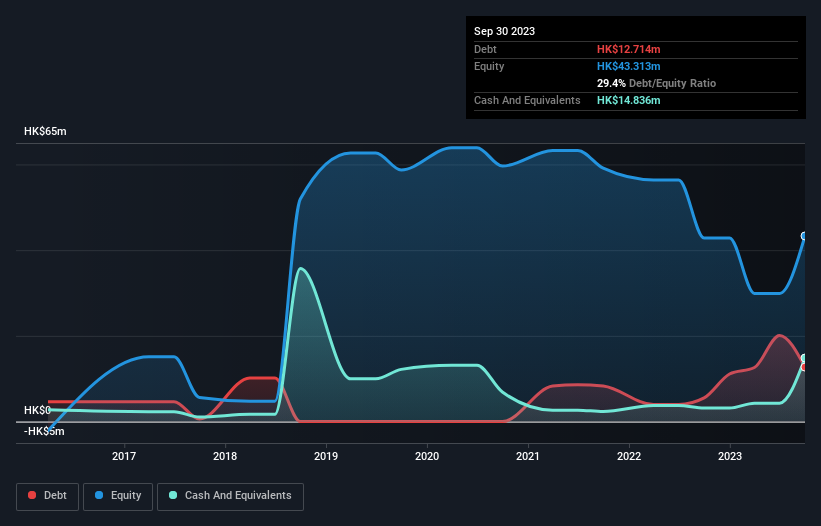- Hong Kong
- /
- Electronic Equipment and Components
- /
- SEHK:8511
Is Min Fu International Holding (HKG:8511) Using Debt In A Risky Way?
Howard Marks put it nicely when he said that, rather than worrying about share price volatility, 'The possibility of permanent loss is the risk I worry about... and every practical investor I know worries about.' It's only natural to consider a company's balance sheet when you examine how risky it is, since debt is often involved when a business collapses. We note that Min Fu International Holding Limited (HKG:8511) does have debt on its balance sheet. But the real question is whether this debt is making the company risky.
What Risk Does Debt Bring?
Generally speaking, debt only becomes a real problem when a company can't easily pay it off, either by raising capital or with its own cash flow. Part and parcel of capitalism is the process of 'creative destruction' where failed businesses are mercilessly liquidated by their bankers. However, a more usual (but still expensive) situation is where a company must dilute shareholders at a cheap share price simply to get debt under control. Of course, the upside of debt is that it often represents cheap capital, especially when it replaces dilution in a company with the ability to reinvest at high rates of return. When we think about a company's use of debt, we first look at cash and debt together.
View our latest analysis for Min Fu International Holding
What Is Min Fu International Holding's Debt?
As you can see below, at the end of September 2023, Min Fu International Holding had HK$12.7m of debt, up from HK$5.53m a year ago. Click the image for more detail. However, its balance sheet shows it holds HK$14.8m in cash, so it actually has HK$2.12m net cash.

How Healthy Is Min Fu International Holding's Balance Sheet?
Zooming in on the latest balance sheet data, we can see that Min Fu International Holding had liabilities of HK$26.7m due within 12 months and liabilities of HK$1.76m due beyond that. Offsetting these obligations, it had cash of HK$14.8m as well as receivables valued at HK$18.9m due within 12 months. So it can boast HK$5.29m more liquid assets than total liabilities.
This short term liquidity is a sign that Min Fu International Holding could probably pay off its debt with ease, as its balance sheet is far from stretched. Simply put, the fact that Min Fu International Holding has more cash than debt is arguably a good indication that it can manage its debt safely. The balance sheet is clearly the area to focus on when you are analysing debt. But you can't view debt in total isolation; since Min Fu International Holding will need earnings to service that debt. So if you're keen to discover more about its earnings, it might be worth checking out this graph of its long term earnings trend.
Over 12 months, Min Fu International Holding saw its revenue hold pretty steady, and it did not report positive earnings before interest and tax. While that hardly impresses, its not too bad either.
So How Risky Is Min Fu International Holding?
Statistically speaking companies that lose money are riskier than those that make money. And the fact is that over the last twelve months Min Fu International Holding lost money at the earnings before interest and tax (EBIT) line. And over the same period it saw negative free cash outflow of HK$17m and booked a HK$25m accounting loss. With only HK$2.12m on the balance sheet, it would appear that its going to need to raise capital again soon. Even though its balance sheet seems sufficiently liquid, debt always makes us a little nervous if a company doesn't produce free cash flow regularly. When analysing debt levels, the balance sheet is the obvious place to start. But ultimately, every company can contain risks that exist outside of the balance sheet. For example, we've discovered 6 warning signs for Min Fu International Holding (4 are a bit concerning!) that you should be aware of before investing here.
If you're interested in investing in businesses that can grow profits without the burden of debt, then check out this free list of growing businesses that have net cash on the balance sheet.
New: Manage All Your Stock Portfolios in One Place
We've created the ultimate portfolio companion for stock investors, and it's free.
• Connect an unlimited number of Portfolios and see your total in one currency
• Be alerted to new Warning Signs or Risks via email or mobile
• Track the Fair Value of your stocks
Have feedback on this article? Concerned about the content? Get in touch with us directly. Alternatively, email editorial-team (at) simplywallst.com.
This article by Simply Wall St is general in nature. We provide commentary based on historical data and analyst forecasts only using an unbiased methodology and our articles are not intended to be financial advice. It does not constitute a recommendation to buy or sell any stock, and does not take account of your objectives, or your financial situation. We aim to bring you long-term focused analysis driven by fundamental data. Note that our analysis may not factor in the latest price-sensitive company announcements or qualitative material. Simply Wall St has no position in any stocks mentioned.
About SEHK:8511
Min Fu International Holding
An investment holding company, engages in the smart manufacturing solutions and burial business in the People’s Republic of China.
Medium-low risk with mediocre balance sheet.
Market Insights
Community Narratives


Recently Updated Narratives


MINISO's fair value is projected at 26.69 with an anticipated PE ratio shift of 20x


The Quiet Giant That Became AI’s Power Grid


Nova Ljubljanska Banka d.d will expect a 11.2% revenue boost driving future growth
Popular Narratives


The company that turned a verb into a global necessity and basically runs the modern internet, digital ads, smartphones, maps, and AI.


MicroVision will explode future revenue by 380.37% with a vision towards success



